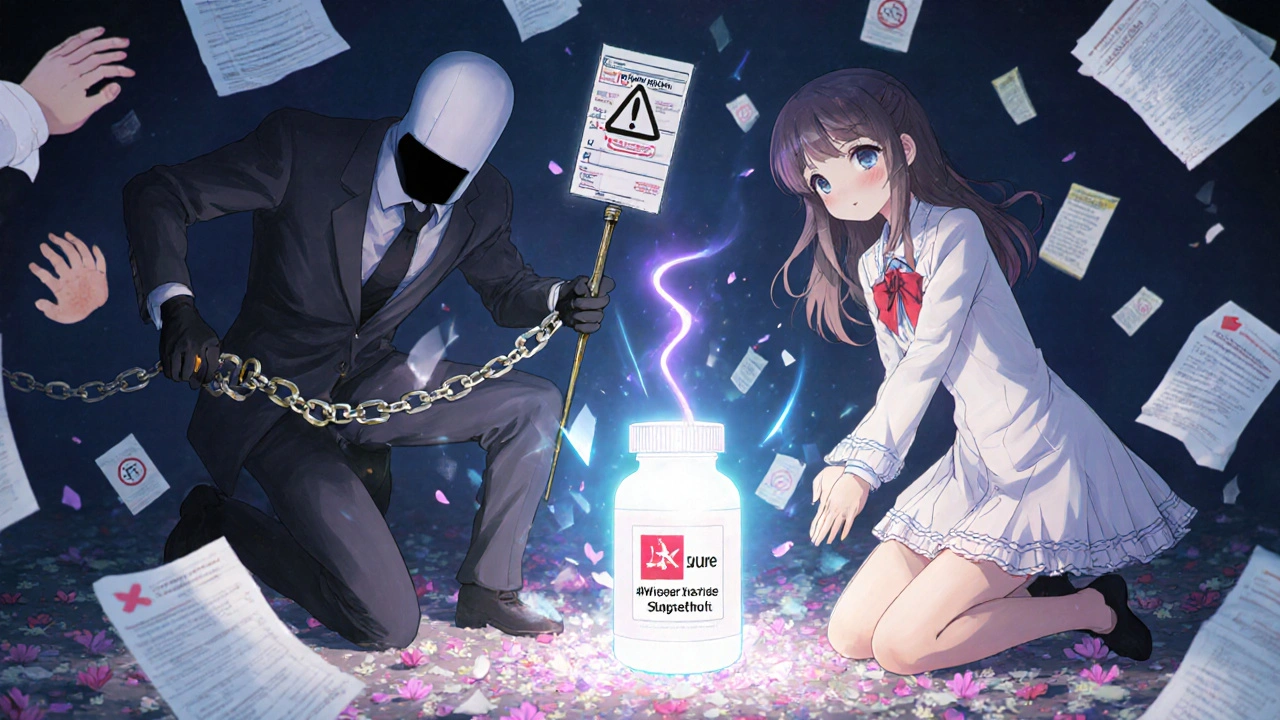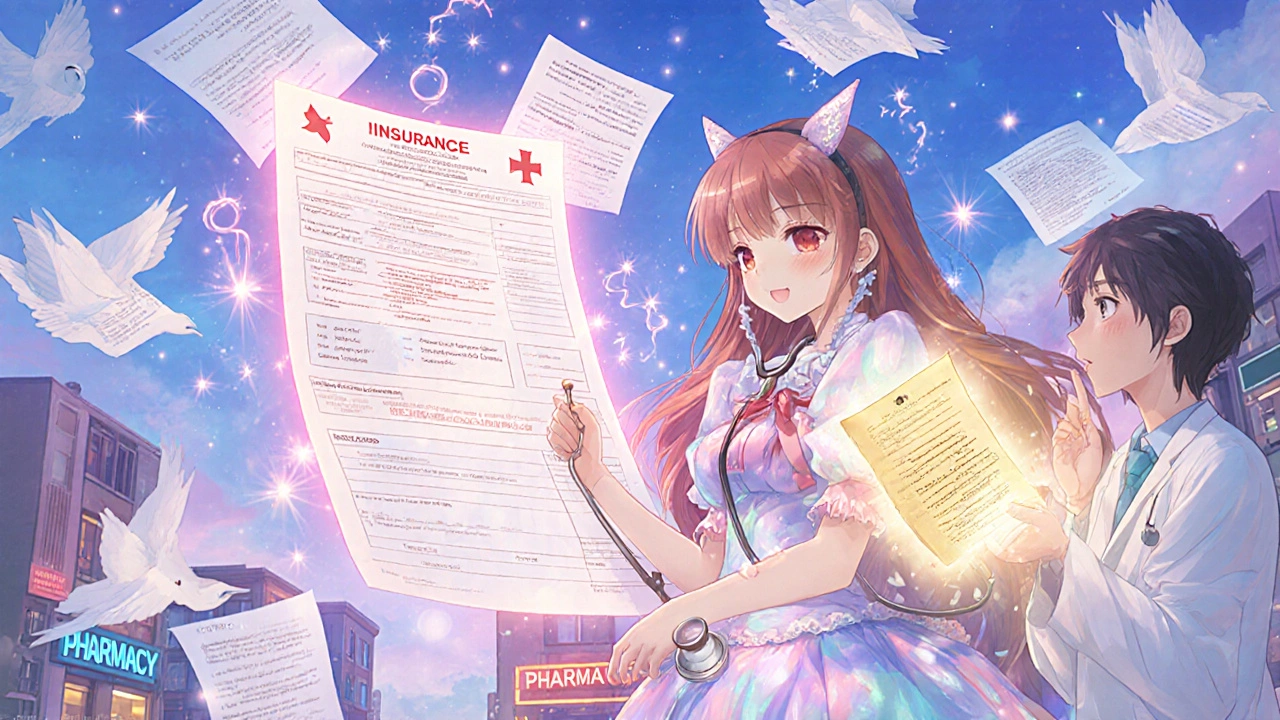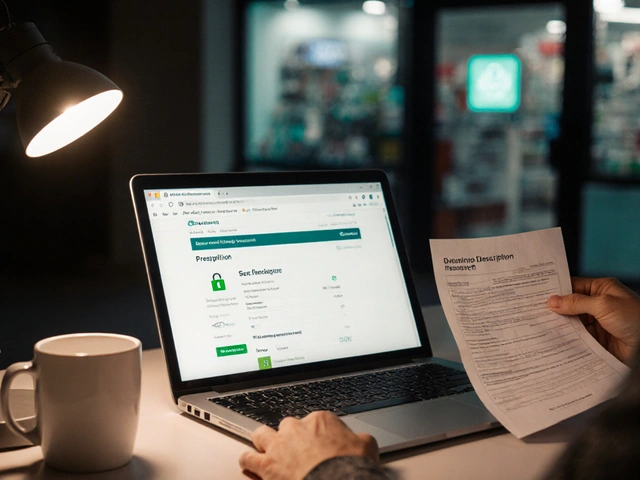When your doctor prescribes a brand-name medication, but your insurance says you must switch to a cheaper generic version - and you know it won’t work for you - you’re not alone. Thousands of people face this every month. Insurance companies use generic medication substitution rules to cut costs, but sometimes those rules ignore your health. The good news? You can fight back. And if you do it right, you have a very good chance of winning.
Why Your Insurance Might Deny Your Medication
Insurance plans don’t just randomly deny drugs. They follow something called a formulary - a list of approved medications they’ll pay for. Most plans push generic versions first because they’re cheaper. That’s fine if the generic works the same. But for many people, it doesn’t. Maybe you had a bad reaction to the generic before. Maybe your condition is so sensitive that even tiny differences in inactive ingredients cause problems. Or maybe you’ve tried the generic already, and it made your symptoms worse. That’s when you need to appeal. The process isn’t complicated, but it’s easy to mess up if you skip steps. The key is documentation. Insurers don’t deny appeals because they’re mean. They deny them because the paperwork is incomplete. You need to give them a clear, clinical reason - not just a personal preference.Step 1: Get Your Explanation of Benefits (EOB)
The first thing you need is your Explanation of Benefits, or EOB. This isn’t your bill. It’s the insurer’s official notice explaining why they denied coverage. Look for phrases like “generic substitution required,” “step therapy not completed,” or “prior authorization denied.” The EOB will also tell you how to appeal. It should list the deadline - usually 180 days from the denial date for commercial insurance. Don’t wait. Start as soon as you get it. If you can’t find your EOB, call your insurer and ask for a copy. They’re legally required to send it.Step 2: Talk to Your Doctor - Right Away
This is the most important step. You can’t appeal without your doctor’s support. Call their office and ask for a letter of medical necessity. Tell them exactly what happened: “My insurance denied my prescription because they want me to use a generic, but I had a severe reaction to it last year.” Your doctor needs to write a letter that includes three things:- Why the brand-name drug is medically necessary - not just “I prefer it.” Say: “Patient developed angioedema after switching to generic lisinopril in 2022.”
- Proof of failed alternatives - if you tried the generic and it didn’t work, say so. “Patient experienced increased tremors and insomnia on levothyroxine generic, switched back to Synthroid with immediate improvement.”
- Clinical guidelines - cite a source. “Per American Thyroid Association Guidelines (2023), brand-name levothyroxine is recommended for patients with prior adverse reactions to generics.”
Step 3: Fill Out the Official Appeal Form
Your insurer will have a form. It might be online, mailed, or available through their member portal. Don’t skip this. Even if you have a great letter, the form is required. Fill it out completely. Include:- Your name, policy number, and member ID
- The exact name of the medication (brand and generic)
- The date of denial
- The reason for denial (copy from your EOB)
- Attach your doctor’s letter
Step 4: Request an Expedited Review If You Need It
If you’re running out of medication, or your condition is getting worse, ask for an expedited appeal. This means the insurer has to respond in 4 business days, not 30. You qualify if:- You’re currently taking the drug and your supply is about to run out
- Your doctor says delaying treatment could cause serious harm
- You’ve had an emergency related to the medication change

Step 5: Wait - But Don’t Just Wait
Insurers have 30 days to respond to a standard appeal. For urgent cases, it’s 4 days. If you don’t hear back in that time, call them. Ask for a case number and who’s handling your appeal. Write down the name, date, and what they said. Many people give up after the first denial. But here’s the truth: 72% of denied appeals are overturned when properly documented. You’re not asking for a favor. You’re exercising a legal right.Step 6: If You Lose, Appeal Again - Outside the Company
If your internal appeal is denied, you get one more shot: an external review. This is handled by an independent third party, not your insurer. For commercial plans, your state’s insurance department usually runs this. For Medicare, it’s the Independent Review Entity. You have 60 days to request this after your internal denial. You don’t need to submit new documents - the same letter and forms you used before will be reviewed again. But this time, it’s not the insurer’s doctor making the call. It’s someone neutral. In California, 92% of formal complaints filed with the state insurance department are resolved in the patient’s favor. Other states have similar programs. Don’t skip this step.Step 7: Use Outside Help If You Need It
You don’t have to do this alone. There are free resources:- State Insurance Commissioner’s Office - every state has one. They can help you understand your rights and even intervene on your behalf. Average response time: under a week.
- Patient Advocate Foundation - offers free appeal templates and coaching. Their data shows patients who use templates have a 65% success rate vs. 32% without.
- Nonprofits - if you have Crohn’s, diabetes, or another chronic condition, your condition’s foundation likely has appeal guides. The Crohn’s & Colitis Foundation reports 63% success for patients who document prior treatment failures.
What Happens If You Win?
If your appeal is approved, your insurer will cover the brand-name drug. They’ll also usually cover the cost of any emergency visits or extra medications you needed while waiting. You might get a letter confirming coverage. Keep it. You may need it later. Some people worry: “Will they deny me again next year?” Maybe. But now you have a record. The insurer knows you’ve won before. That makes your next appeal much easier.
What If You Lose - And You Can’t Afford the Drug?
If the external review fails, you still have options:- Ask your doctor for samples
- Check patient assistance programs - most drugmakers offer them
- Use GoodRx or SingleCare for cash discounts - sometimes cheaper than your co-pay
- Switch to a different insurance plan during open enrollment
Real Stories: What Works
A Type 1 diabetic in Texas was denied semaglutide because her plan only covered metformin. She had 7 documented episodes of severe hypoglycemia on other drugs. Her doctor cited ADA guidelines. Appeal approved in 18 days. A woman with lupus was forced to switch from brand-name hydroxychloroquine to generic. She developed a rash and vision changes. Her rheumatologist attached a photo of the rash and cited ACR guidelines. Appeal approved. She got her medication back. A man with Crohn’s tried three generics for mesalamine. Each one triggered a flare. His doctor wrote a 3-page letter with lab results and prior treatment logs. External review overturned the denial in 11 days. These aren’t rare cases. They’re typical. You just need to be thorough.What Doesn’t Work
People often think saying “I can’t afford the generic” or “I like the brand better” will help. It won’t. Insurers don’t care about preference or cost to you - only clinical risk. Another mistake: waiting until your prescription runs out. That’s when you panic. Don’t wait. Start the appeal as soon as you’re denied. And never skip the doctor’s letter. One Johns Hopkins study found 41% of failed urgent appeals were due to missing or vague clinical documentation.Final Tips
- Keep copies of everything - EOB, letter, forms, emails, call logs
- Use certified mail for paper submissions - get a tracking number
- Don’t let your doctor rush the letter - give them at least 3 business days
- Track your appeal online if your insurer offers it
- Set a calendar reminder for deadlines
How long do I have to file an insurance appeal for a generic medication?
For commercial insurance plans, you have 180 calendar days from the denial date to file an internal appeal. Medicare Part D gives you 120 days. Medicaid timelines vary by state, but most allow at least 60 days. Always check your Explanation of Benefits (EOB) - it lists your deadline.
Do I need a letter from my doctor to appeal?
Yes. A letter from your doctor is required. It must include: why the brand-name drug is medically necessary, evidence of failed alternatives, and references to clinical guidelines. Without this, your appeal will likely be denied. Doctors who include all three elements have a success rate over 75%.
What’s the difference between an internal and external appeal?
An internal appeal is reviewed by your insurance company’s own medical team. If that’s denied, you can request an external review - handled by an independent third party, not your insurer. External reviews have higher approval rates, especially for Medicare Part D, where 63.2% of second-level appeals are overturned.
Can I appeal if I’ve never tried the generic version?
Yes. You don’t need to try the generic first if your doctor can prove it’s medically inappropriate. For example, if you’ve had a serious allergic reaction to a generic in the past, or if your condition requires precise dosing (like thyroid or epilepsy drugs), your doctor can justify skipping the step therapy requirement.
What if my doctor won’t help me with the appeal?
If your doctor refuses, ask to speak with the office manager or medical director. Many practices have templates for these letters. You can also download free appeal templates from the Patient Advocate Foundation or your condition-specific nonprofit. If your doctor still won’t help, consider switching to a provider who understands insurance barriers - especially if you have a chronic condition.
How successful are insurance appeals for generic medications?
About 72% of denied appeals are overturned when properly documented. Success rates are higher for specialty drugs - oncology drugs have an 82% overturn rate. The biggest factor? A detailed letter from your doctor that includes clinical evidence and guidelines. Appeals without this documentation are rarely approved.





Shubham Semwal
Bro this is the exact reason I stopped trusting insurance. My doc prescribed my thyroid med brand-only after I went into full-on panic mode on the generic - tremors, insomnia, felt like my brain was vibrating. Insurance said ‘try it again’ like it’s a video game level. I did. Got worse. Then I had to drag my doctor into writing a 3-page letter citing ADA guidelines. Took 3 weeks. They finally approved it. Now I keep a printed copy of that letter in my wallet. Don’t let them gaslight you.
Sam HardcastleJIV
One is compelled to observe, with a certain degree of academic detachment, that the institutional mechanisms described herein reflect a broader epistemological crisis within healthcare economics - wherein patient autonomy is subordinated to actuarial calculus. The letter of medical necessity, while pragmatically effective, remains a performative gesture within a system that commodifies biological vulnerability. One wonders, then, whether the real victory lies not in overturning denials, but in dismantling the architecture that necessitates them.
Mira Adam
Let me tell you something - doctors are lazy. They don’t want to write letters. They’ll tell you ‘it’s too much work’ and then you’re stuck. I had to draft my own letter and hand it to my rheumatologist with a highlighter and say ‘sign this or I’m switching doctors.’ She signed it. Approved in 11 days. Stop waiting for them to save you. Save yourself.
Miriam Lohrum
There’s something quietly brutal about being told your body is too expensive to treat properly. We don’t talk about this enough - how insurance isn’t just denying drugs, it’s denying the legitimacy of your suffering if it doesn’t fit their spreadsheet. The fact that you need a doctor to validate your pain - that’s the real illness here. Not the condition. The system.
Emma Dovener
For anyone outside the US - this is why we need universal healthcare. In Canada, generics are only substituted if the doctor doesn’t specify ‘do not substitute.’ No appeals. No letters. No 180-day deadlines. Just take the med or don’t. My mom has lupus and got her brand-name hydroxychloroquine without a fight. It’s not perfect, but at least you don’t have to become a full-time bureaucrat just to stay alive.
Aishwarya Sivaraj
OMG this post saved my life last year. I had crohns and tried 3 generics of mesalamine and each time i got flare ups so bad i ended up in er. Doc was like ‘try again’ so i told him to f off and i found this guide. Printed it out gave it to him. He wrote the letter same day. External review approved in 9 days. I still cry when i think about it. If you’re reading this and scared - just start step 1. You got this. I’m not even kidding. The system sucks but you can beat it. Just don’t give up. P.S. use patient advocate foundation templates they’re free and actually good
Iives Perl
They’re watching. They know who appeals. Next time you apply for life insurance? They’ll see you fought for your meds. They’ll raise your rates. Or worse - deny you. This isn’t justice. It’s a trap. The real goal isn’t to get your drug - it’s to make you give up. Don’t fall for it. But also… don’t trust them. Ever. 😈
steve stofelano, jr.
Thank you for this comprehensive and meticulously structured guide. The procedural clarity provided herein represents an invaluable resource for patients navigating an otherwise opaque and adversarial administrative landscape. I would respectfully suggest that this content be archived by the American Medical Association and disseminated through affiliated physician networks as a standardized educational tool. The alignment of clinical evidence with bureaucratic protocol, as delineated, exemplifies the very best of patient advocacy.